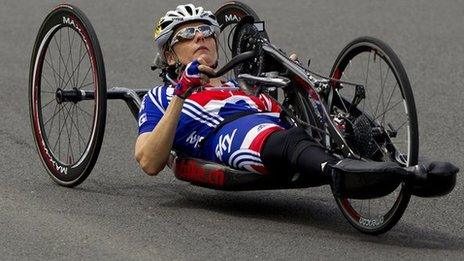Kadeena Cox: Briton targets double Paralympic success
- Published
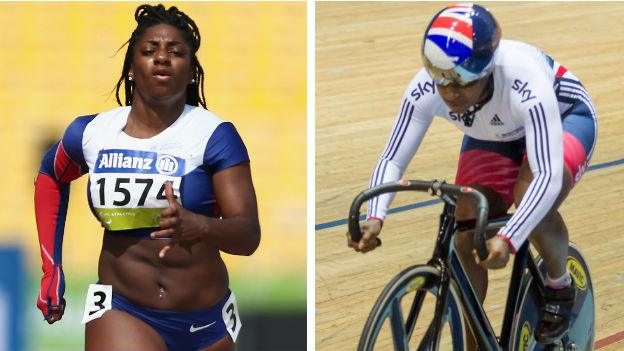
Cox began her sporting career on the athletics track but has also proved to be a talented cyclist
Training for one sport at an elite level requires a phenomenal amount of time, effort and dedication.
But British Paralympic hopeful Kadeena Cox is pushing the boundaries as she bids to compete and win medals in two sports at September's Rio Games.
Cox was a talented sprinter before a stroke in May 2014 led to Multiple Sclerosis. She returned to the track but also found she had a talent for cycling and is now part of the national set-ups for both sports, having put in an impassioned plea to be part of both squads ahead of Rio.
She won gold in the T37 100m at the IPC Athletics World Championships in Doha in October and will be aiming for her first international cycling titles in next month's UCI Para-cycling Track World Championships in Italy.
While she is not the first athlete to excel in two different sports - cycling team-mates Dame Sarah Storey and Jody Cundy are among those to win medals in one sport before switching - she is aiming to be the first GB athlete since Isabel Barr (later Newstead), who was successful in shooting and athletics in Seoul in 1988, to win medals in two sports at one Games.
How is Cox so good?
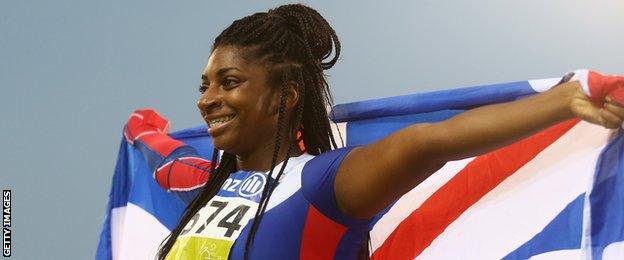
Cox set a new world record of 13.59 seconds in the heats before winning gold in the T37 100m at the World Championships
The 24-year-old from Leeds has always been a talented sportswoman. Before her illness she was a useful 100 and 200m sprinter and at the time of her illness was bidding for a place on the GB bob skeleton programme.
But despite the MS affecting her movement, especially down the right side of her body, her ability to run fast remains.
"I knew I would still be good at athletics, mainly because of muscle memory," she told BBC Sport. "Most people say now that I run better than I walk.
"With the cycling, I wasn't sure how it was going to go but we established that I had massive power in my legs and so we worked on what I was good at.
"I kept practising my starts over and over again, assuming that the rest would come, which it has."
How did the decision to take part in two elite sports come about?
Going to Doha, Cox was unsure whether she would continue in athletics or focus solely on cycling, but a controversial disqualification in her 200m,, external a situation she admits to not dealing well with at the time, ended her hopes of possibly finishing on a high.
"I knew I couldn't walk away from athletics because I had the potential to do so much more," she says. "Winning the 100m in Doha in a new world record means that as long as I show form this year I will be selected for Rio.
"But I knew I wanted to do both sports. I couldn't walk away from either because I was so good at both and there was a good opportunity there.
"I have relapsing remittent MS and I don't know how much more time as an athlete I have got so by the time Tokyo 2020 comes along I might not even in a position to take part in one event."
Both athletics and cycling agreed to Cox's plea to be able to do both sports, meaning she now has to deliver the medals that they are expecting from her.
"When I was pushing to do both, I was adamant I could, but as soon as I was told I could do both, I got a bit scared," she admits.
"The sports have put their faith in me and now I have to go and deliver."
The challenge of combining two sports
Cox now splits her time between the Manchester Velodrome, where she is based with the rest of the GB Para-cycling squad and also receives her medical support, and her athletics training in Leeds.
Cox's weekly training schedule | |
|---|---|
Monday: Gym | |
Tuesday: Afternoon athletics session | |
Wednesday: Recovery day | |
Thursday: Cycling session (Velodrome) | |
Friday: Gym followed by cycling session | |
Saturday: Athletics | |
Sunday: Recovery day |
"The training sessions in both sports have to focus on quality, rather than quantity," she explains. "Because of that, in some ways I find it easier to train for two sports rather than one.
"It is tough because everything I do in the training sessions has to be right on the money, but it is easier as I have two recovery days during the week.
"But I don't get bored of training because I have both sports to keep me fresh. It makes it interesting and exciting."
Cox is working with coaches Brian Scobie (athletics) and Jon Norfolk (cycling) to see how her body reacts to certain training scenarios - and more importantly, to try to stay clear of injuries.
What might happen in Rio?
If selected in both sports, Cox's programme in Rio would see the 100m final on the evening of Friday 9 September, followed by a dash to the velodrome the following morning for the C2 500m time trial with the team sprint heats and finals the next day before a break ahead of the 4x100m relay.
Cox's possible Rio programme | |
|---|---|
Thursday 8 September (PM) | T37 100m heats (athletics) |
Friday 9 September (PM) | T37 100m final (athletics) |
Saturday 10 September (AM) | C1-3 500m time trial finals (cycling) |
Sunday 11 September (AM) | Mixed team sprint heats (cycling) |
Sunday 11 September (PM) | Mixed team sprint final (cycling) |
Friday 16 September (PM) | T35-38 4x100m relay (athletics) |
While most people would describe the schedule as 'daunting' she prefers to describe it as 'exciting but tough' but knows her MS can present a challenge.
"My body doesn't always recover that well in a short period of time and I suffer with muscle spasms after exercise," she says.
"My team and I have talked over the programme numerous times and my physiologist and the physiotherapist are working on a mock-up of it.
"We are trying to see what triggers my condition and what calms me down so when we get to Rio we know what works and we have rehearsed to the best of our abilities."
What do other people think?
"My mum thinks I am crazy and my dad worries I am stretching myself too thinly," she reveals. "They are just worried about my health.
"My friends just think it is amazing and all the guys I train with don't know how I manage to do the other sport when they struggle to do one, but it's a cool thing to do.
"I am very stubborn. I know what I want and I will always go for what I want. There is always deeper meaning to what I want - it's not just about the medals.
"I want to spread the word about MS and give hope to those who are diagnosed with it and show that you can still be involved in sport.
"My walking is still not beautiful but it is a lot better than it was and I can still do stuff that I would never have been able do had I not got back into sport."
- Published3 February 2016
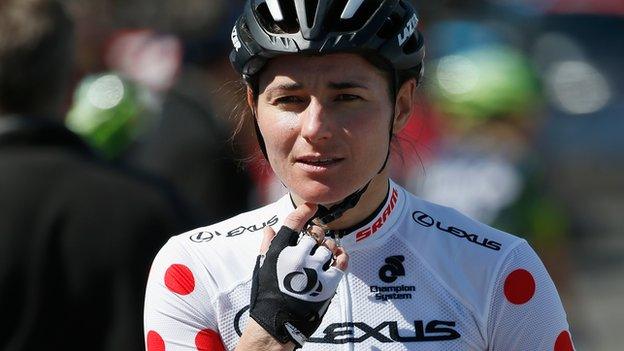
- Published29 October 2015
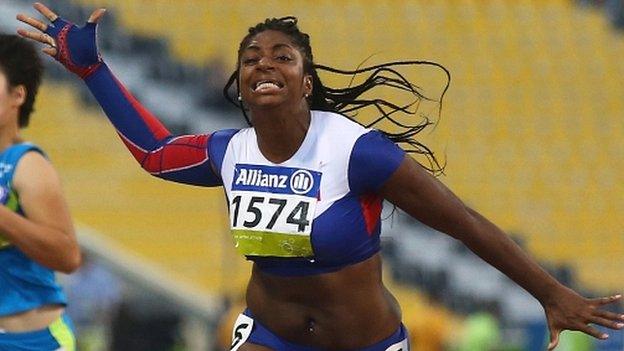
- Published22 October 2015
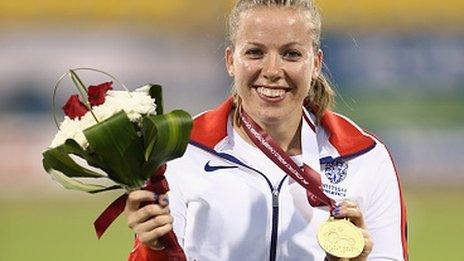
- Published5 September 2016
